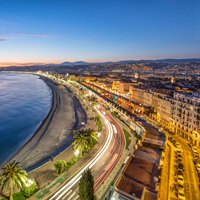Real Estate in France
Last updated on Jan 08, 2024
Summary: An expat should begin their search for a home to buy in France by researching the different regions and cities in the country. They should also consider their budget and the type of property they are looking for. It is also important to research the local real estate market and the availability of properties in the area. Foreigners are allowed to purchase property in France, however, there are certain restrictions in place. For example, foreigners are not allowed to purchase agricultural land or property in certain protected areas. Houses in France typically include amenities such as a kitchen, bathroom, living room, and bedrooms. Depending on the property, they may also include a garden, terrace, balcony, or garage.
How do I find a place to live in France?
We asked expats how they chose their neighborhood and found a place to live. They answered:
"One way to find a place to live in France is to search online and compare different listings. You can search websites like Immobilier.fr and SeLoger.com to find property listings. Additionally, you can search for a French real estate agent who can help you find a property in your desired area. You can also look for online forums where people post about their experiences in France, as well as ask for advice from locals. Another way to find a place to live is to reach out to contacts in France; people you know can provide tips on the best places to look for rental properties. Once you have narrowed down your choices, you can contact the landlords to see if you can view the property before deciding if it's the right place for you," said one person in France.
"My husband asked his new collegues about the neighborhoods. One of his collegues (from HR) helped us find our home, we did a lot ourselves and my father, who lives here already, helped us too," said one expat who made the move to Dijon.
 French Riviera House Hunting - FRH
French Riviera House Hunting - FRHConnect
We are the best possible negotiator to help our expatriate clients to safely, efficiently and effectively find the right property in the right place in the French Riviera. Whether buying or renting, French Riviera House Hunting's objective is to find the best place for you, making sure that there are no hidden problems in the acquisition or renting process!
Click connect to have our partner contact you via e-mail and/or phone.
 French Riviera House Hunting - FRH
French Riviera House Hunting - FRHWe are the best possible negotiator to help our expatriate clients to safely, efficiently and effectively find the right property in the right place in the French Riviera. Whether buying or renting, French Riviera House Hunting's objective is to find the best place for you, making sure that there are no hidden problems in the acquisition or renting process!
Connect
Click connect to have our partner contact you via e-mail and/or phone.
What is a typical expat home or apartment like in France?
"I live in an apartment provided by the state as my husband is a government employee. This is definitely NOT typical of expats because most of them would not be allowed to have this kind of housing. Most american expats would want something in better condition. We are willing to do work ourselves though because the rent is less than half of what it would be normally. Also, we were on a waiting list for a LONG time before we got this place. Most expats don't have that much time. Most of them also make more money too. I love our huge terrace and the view of the Eiffel Tower! I love our neighborhood - no tourists, near a nice park, friendly neighbors. I like that the toilet is separate from the bathroom, but wish there was a sink in there with it. I hate how kitchens in France are completely empty and closets don't even have shelves or something to hang clothes on. I love that our apartment has a large walk-in closet, but he had to construct the inside ourselves," said one expat in Paris.
"When moving to the dept 62 pas de Calais, remember to bring wet weather clothing for all the year round, and at least warm clothing for the 6 months of winter," remarked one member in France.
"Generally, an expat home or apartment in France would be equipped with the necessary comforts, such as a living space, fully equipped kitchen, and modern amenities like WiFi and television. Expat homes and apartments often have great views due to their prime location, and most often come with balconies and terraces. Security, comfort and privacy are of great importance when it comes to expat homes and apartments in Paris, so tenants can often expect to find modern locks and smart-home technology. Additionally, many expats also find themselves living in furnished or serviced apartments, which often come with a concierge, amenities, and all the necessary furniture for a comfortable stay," explained one expat living in France.

We are the best possible negotiator to help our expatriate clients to safely, efficiently and effectively find the right property in the right place in the French Riviera. Whether buying or renting, French Riviera House Hunting's objective is to find the best place for you, making sure that there are no hidden problems in the acquisition or renting process!
Click connect to have our partner contact you via e-mail and/or phone.

We are the best possible negotiator to help our expatriate clients to safely, efficiently and effectively find the right property in the right place in the French Riviera. Whether buying or renting, French Riviera House Hunting's objective is to find the best place for you, making sure that there are no hidden problems in the acquisition or renting process!
Click connect to have our partner contact you via e-mail and/or phone.
What is the average cost of housing in France?
If you are thinking about moving to France, cost of living in probably a key consideration. Expats commented about the cost of housing:
"The cost of housing in France varies greatly depending on the area and type of accommodation. Overall, it is generally more expensive to rent than to own property, although buying a property in France can be an expensive venture due to high taxes and notary fees. The cost of housing in Paris is particularly high, but in other parts of the country, prices can be quite affordable," explained one expat living in France.
"Well, because it's a state home our rent is very cheap. Still you can't compare to all of America. Normally rent here is much cheaper than New York City. But it's still much higher than, say, in Tucson, Arizona where I also lived. I know before, apartments in Paris could run from 125 - 150 FF per square meter. You do the math for Euros," said one person in Paris.
Should I buy or rent a home in France?
If you have not spent a lot of time in France, you should rent before even thinking about buying. We asked expats there about the buy vs. rent decision:
"Buying a home in France is an attractive option for long-term residence and investments, but renting a home may make more sense for short-term stays. Renting can be more cost-effective when factoring in upfront costs and ongoing maintenance fees. You may also be able to find rentals that provide access to amenities that may not be available when purchasing a home. It all depends on your goals and budget. Renting can also provide you with some flexibility in case you decide you want to move to a different part of the country. Ultimately, it is important to do your research and consider both your goals and budget before making a decision," said one expat who made the move to France.
"We had bought our home in 2004 and spent all our holidays (winter and Summer) at the house making a few changes and keeping the garden in check. Like any purchase in a foreign country there are different rules and regulations so it is as well to ensure you have a reliable agent and notaire to guide the process. If French is not your first language, or you are not fluent,or your notaire is not bi-lingual, then it is a requirement to have an authorised translator at the signings," explained one foreigner living in Aude and Herault Departments, France.
"I bought a 400 year old village house after living a year in an apartment in Montpellier. The process is difficult due to the searching and then the closing takes months," said one in Pezenas.
What do I need to know when buying property in France?
When we asked expats what advice they would give a foreigner before buying a property in France, they said:
"1. You should research the local property market to understand the competition, as well as the local regulations concerning property taxes and registration. 2. You should also be aware of the process of buying property in France, and the documents and paperwork required. 3. Consider hiring a professional interpreter or attorney to guide you through the process and make sure your rights are fully protected. 4. You should research the development potential of the property, so you understand the risks associated with buying. 5. Make sure you are aware of the legal requirements for owning and living in France, such as residency and work permits, and the specific regulations per region. 6. Account for any additional costs that may be associated with buying French property, such as notary fees, insurance, and renovation costs. 7. Research options for financing your purchase, such as mortgages and other loan options available in the French market," explained one person living in France.
Are foreigners allowed to own property in France?
When we asked expats what advice they would give a foreigner before buying a property in France, they said...
"Yes, foreigners are allowed to own property in France. Non-residents of France are allowed to purchase property in the same way as French citizens, however, there are some restrictions. For example, non-residents are not allowed to purchase agricultural land or property in certain protected areas. Additionally, non-residents may be subject to additional taxes and fees. It is important to research the laws and regulations in the specific region of France before purchasing property," said one person in France.
What appliances are typically included in a rental?
We asked foreigners in France what appliances are typically included in a rental, and, if there is anything else included or not included that a newcomer would not expect. Replies included:
"A rental property in France typically includes basic kitchen appliances such as a refrigerator and stovetop, as well as a washing machine and dryer. In some cases, air conditioners and heating systems are also included. Furnishings, such as a bed and chairs, are usually not provided," said one person in France.
Additional Information about Searching for a Home in France:
We asked foreigners in France what appliances are typically included in a rental, and, if there is anything else included or not included that a newcomer would not expect. Replies included...
"Expats can search for homes in France by using online real estate websites, such as SeLoger.com, Bienici.com, and Leboncoin.fr. They can also contact local real estate agents who specialize in helping expats find homes in France. Additionally, expats can search for homes in France by attending open houses and visiting local neighborhoods," explained one person living in France.
About the Author
 Joshua Wood, LPC joined Expat Exchange in 2000 and serves as one of its Co-Presidents. He is also one of the Founders of Digital Nomad Exchange. Prior to Expat Exchange, Joshua worked for NBC Cable (MSNBC and CNBC
Primetime). Joshua has a BA from Syracuse and a Master's in Clinical and Counseling Psychology from Fairleigh Dickinson University. Mr. Wood is also a licensed counselor and psychotherapist.
Joshua Wood, LPC joined Expat Exchange in 2000 and serves as one of its Co-Presidents. He is also one of the Founders of Digital Nomad Exchange. Prior to Expat Exchange, Joshua worked for NBC Cable (MSNBC and CNBC
Primetime). Joshua has a BA from Syracuse and a Master's in Clinical and Counseling Psychology from Fairleigh Dickinson University. Mr. Wood is also a licensed counselor and psychotherapist.
Some of Joshua's articles include Pros and Cons of Living in Portugal, 10 Best Places to Live in Ireland and Pros and Cons of Living in Uruguay. Connect with Joshua on LinkedIn.
Additional Information:
- France Guide
- Healthcare & Health Insurance in France
- Members Talk about Healthcare & Health Insurance in France
- Best Places to Live in France
- Real Estate in France
- Guide to Real Estate in France
- Pros & Cons of Living in France
- Cost of Living in France
- Do I need Health Insurance When Moving to France?
- Best Places to Ski in France
- Having a Baby in France
- Health Insurance for Expats in France
- Pros and Cons of Living in France 2025
- 2025 Guide to Moving to France




